- Home
- Robert Graves
Goodbye to All That Page 9
Goodbye to All That Read online
Page 9
At the first Battalion Orderly Room that I attended, a case went like this:
SERGEANT-MAJOR (off-stage): Now, then, you 99 Davies, F-Company, cap off, as you were, cap off, as you were, cap off! That’s better. Escort and prisoner, right turn! Quick march! Right wheel! (On stage) Left wheel! Mark time! Escort and prisoner, halt! Left turn!
COLONEL: Read the charge, sergeant-major.
SERGEANT-MAJOR: NO. 99 Pte W. Davies, F-Company, at Wrexham on 20th August: improper conduct. Committing a nuisance on the barrack square. Witnesses: Sergeant Timmins, Corporal Jones.
COLONEL: Sergeant Timmins, your evidence.
SERGEANT TIMMINS: Sir, on the said date about two p.m., I was hacting horderly sar’nt. Corporal Jones reported the nuisance to me. I hinspected it. It was the prisoner’s, sir.
COLONEL: Corporal Jones! Your evidence.
CORPORAL JONES: Sir, on the said date I was crossing the barrack square, when I saw prisoner in a sitting posture. He was committing excreta, sir. I took his name and reported to the orderly sergeant, sir.
COLONEL: Well, Private Davies, what have you to say for yourself?
99 DAVIES (in a nervous sing-song): Sir, I came over queer all of a sudden, sir. I haad the diarrhoeas terrible baad. I haad to do it, sir.
COLONEL: But my good man, the latrine was only a few yards away.
99 DAVIES: Colonel, sir, you can’t stop nature!
SERGEANT-MAJOR: Don’t answer an officer like that!
(Pause.)
SERGEANT TIMMINS (coughs): Sir?
COLONEL: Yes, Sergeant Timmins?
SERGEANT TIMMINS: Sir, I had occasion to hexamine the nuisance, sir, and it was done with a heffort, sir!
COLONEL: Do you take my punishment, Private Davies?
99 DAVIES: Yes, colonel, sir.
COLONEL: You have done a very dirty act, and disgraced the regiment and your comrades. I shall make an example of you. Ten days’ detention.
SERGEANT-MAJOR: Escort and prisoner, left turn! Quick march! Left wheel!
(Off-stage): Escort and prisoner, halt! Cap on! March him off to the guard-room. Get ready the next case!
Orderly Room always embarrassed and dispirited me. I never got used to it, even after sentencing thousands of men myself. The sole change brought by the introduction of the civilian element into the army was that, about half-way through the war, an Army Council Instruction laid down that henceforth the word of command must be: ‘Accused and escort, right turn, quick march…’ instead of ‘Prisoner and escort, right turn, quick march…’ Few interesting cases ever came up. Even the obscene language, always quoted verbatim, continued drearily the same; the only variation I remember from the four stock words was provided by the man, charged with using threatening and obscene language to an N.C.O., who had told a lance-corporal: ‘Corporal Smith, two men shall meet before two mountains.’ When the colonel asked what this meant, the lance-corporal explained that though two mountains could never meet, two men might, and these two might be himself and the prisoner; and the meeting might be in peacetime, and the prisoner might then be tempted to strike him. Despite the remoteness of this contingency, the prisoner got seven days’ detention – in the Camp Prison. Humour was mainly supplied by the very Welsh Welshmen from the hills, who had an imperfect command of English. One of them, charged with being absent off ceremonial parade and using obscene language to the sergeant, became very indignant in Orderly Room and cried out to the colonel: ‘Colonel, sir, sergeant tole me wass I for guard; I axed him no, and now the bloody bastard says wass I.’
The greatest number of simultaneous charges that I ever heard brought against a soldier occurred in the case of Boy Jones, at Liverpool in 1917. They accused him, first, of using obscene language to the bandmaster. (The bandmaster, who was squeamish, reported it as: ‘Sir, he called me a double effing c—.’) Next, breaking out of the detention awarded for this crime. Then, ‘absenting himself from the regiment until apprehended in the Hindenburg Line, France.’ Fourth resisting an escort. Fifth, being found in possession of regimental property belonging to the Cheshire Regiment. Boy Jones, who was only fourteen, and looked thirteen, had wriggled through the bars of his detention-cell and, after getting a few things together in his hut, gone to Liverpool Exchange Station to wait for a victim – who proved to be a private in a Cheshire Bantam Battalion, just returning to France from leave. Bantam Battalions consisted of volunteers hitherto too short to qualify for the army. Boy Jones treated the bantam to a lot of drink and robbed him of his rifle, equipment, badges, and papers. He then went off in his place. Arrived in France, he proceeded to the Bantam Battalion; but this did not suit him. He wanted to be with his own regiment; so he deserted the Bantams, who were billeted somewhere north of Arras, and walked south along the trenches looking for his regiment, having now resumed his proper badges. A couple of days’ walk brought him to the Second Battalion Headquarters where he reported, but was immediately sent home, after a tough struggle with his escort at the railhead. The punishment awarded for all these heinous offences – ‘ten days confined to camp’, and a spanking by the bandmaster – seemed to us very nicely calculated.
A most unusual charge, against the regimental goat-major (a corporal), was first framed as lese majesty, but later reduced to ‘disrespect to an officer: in that he, at Wrexham – on such and such a date – did prostitute the Royal Goat, being the gift of His Majesty, the Colonel-in-Chief, from His Royal Herd at Windsor, by offering its stud-services for a fee to —, Esq., farmer and goat breeder, of Wrexham.’ Though the goat-major pleaded that he had done this out of consideration for the goat, to which he was much attached, the Colonel reduced him to the ranks and took away his job.
In peacetime, the regular battalions of the regiment, though officered mainly by Anglo-Welshmen of county families, did not contain more than about one Welsh-speaking Welshman in fifty. Most recruits came from Birmingham. The only Harlech man besides myself, who joined the regiment at the start was a golf caddie. He had got into trouble a short time before for stealing clubs. The chapels held soldiering to be sinful, and in Merioneth the chapels had the last word. Prayers were offered for me by the chapels, not because of the physical dangers I would run in France, but because of the moral dangers threatening me at home. However, when Lloyd George became Minister of Munitions in 1915, and persuaded the chapels that war was a Crusade, we had a sudden tremendous influx of Welshmen from North Wales. They were difficult soldiers, who particularly resented having to stand still while N.C.O.s swore at them.
At Wrexham, we second-lieutenants learned regimental history, drill, musketry, Boer War field-tactics, military law and organization, how to recognize bugle calls, how to work a machine-gun, and how to conduct ourselves on formal occasions. We dug no trenches, handled no bombs, thought of the company, not of the platoon, still less of the section, as the smallest independent tactical unit. Only two wounded officers were back from the front at the time; both had left the Second Battalion on the retreat from Mons. Neither would talk much of his experiences. One of them, ‘Emu’Jones, would tell us no more than this: ‘The first queer sight I saw in France was three naked women hanging by their feet in a butcher’s shop.’ The other used to say: ‘The German shells knock hell out of a man, especially the big black ones. Just hell. And that fellow Emu – he wasn’t any good. We marched and marched, and with his weak heart he used to faint daily and expect his poor bloody platoon to carry him as well as the rest of their load. Everyone swore he was skrimshanking. Don’t believe what old Emu tells you of the Retreat.’
11
I USED to congratulate myself on having quite blindly chosen the Royal Welch Fusiliers, of all regiments in the army. ‘Good God!’ I used to think. ‘Suppose that when the war broke out I had been living in Cheshire, and had applied for a commission in the Cheshire Regiment.’ How ashamed I should have been to find in the history of that regiment – the old Twenty-second Foot, just senior in the line to the Royal Welch, the Twenty-third –
that it had been deprived of its old tide ‘The Royal Cheshires’ as a punishment for losing a battle. (This was a quite unhistorical libel, but we all believed it.) Or how lucky not to have joined the Bedfords, who were making a name for themselves in this war, but were still called ‘The Peacemakers’; for they had only four battle-honours on their colours, none more recent than the year 1711, and we misquoted their regimental motto as: ‘Thou shalt not kill!’ Even the Black Watch had a stain on its record; and everyone knew about it. If a Tommy of another regiment went into a public bar where men of the Black Watch were drinking, and felt brave enough to start a fight, he would ask the barmaid not for ‘pig’s ear’, which is rhyming-slang for beer, but for a pint of ‘broken square’. Then belts would be unbuckled.
The Royal Welch had twenty-nine battle-honours, a number equalled only by a couple of other two-battalion regiments. And here, too, the Royal Welch had the advantage, since these were not single regiments, but 1888 combinations of two each with its separate history. The First Battalion of the Royal Welch Fusiliers could boast twenty-six battle-honours of its own, the remaining three having fallen to the Second Battalion in its short and interrupted existence. They were all good bloody battle-honours, none of them like that battle into which, it was said, the Argyll and Sutherland Highlanders had gone with nine hundred men and from which they emerged with nine hundred and one – no casualties, and a band-boy come of age and promoted a private. For many hard fights, such as The Boyne and Aughrim and the capture of Lille, the Royal Welch had never been honoured. The regiment shared in each of the four hardest fought victories of the British Army, as listed by Sir John Fortescue. My regimental history is rusty now, but I believe that they were Malplaquet, Albuhera, Waterloo, and Inkerman. The Royal Welch was also one of the six Minden regiments, who performed the unprecedented feat of charging a body of cavalry many times their own strength and driving it off the field. Even the surrender at York Town in the American War of Independence, the regiment’s single disaster, could not be accounted a disgrace. The Navy had let the Army down; and the Royal Welch were accorded the full honours of war, won by their conduct in the hard fighting at Lexington and Guildford Court House, and their suicidal advance up Bunker Hill. The original ‘Thomas Atkins’ was a Royal Welch Fusilier in that war.
I caught the sense of regimental tradition a day or two after my arrival at the depôt. In a cupboard at the mess, I came across a big leather-bound ledger and pulled it out to read. It proved to be the Daily Order Book of the First Battalion in the trenches before Sevastopol, and I opened it at the page giving orders for an attack on the Redan Redoubt. Such and such a company was desired to supply volunteers for the storming party under Lieutenant So-and-so. Next followed details of their arms and equipment, the number of ladders they must carry, and the support to be afforded by other companies. Then details of rations and supply of ammunition, with an earnest ‘Godspeed!’ from the commanding officer. (A sketch of the commanding officer hung on the wall above my head, lying sick in his tent at Scutari, wearing a ‘Balaclava helmet’, or cap-comforter, against the intense cold.) The attack failed, and among subsequent entries were orders for the burial of the dead, appreciation from headquarters of the gallantry vainly displayed, and a notice that the effects of Lieutenant So-and-so, who had led the storming party, would be sold at public auction in the trenches next day. Another Daily Order contained the citation of a certain Sergeant Luke O’Connor’s gallantry, for which he received one of the first Victoria Crosses when the award was instituted in 1856. He still lived – Lieutenant-General Sir Luke O’Connor, now colonel of the regiment.
The most immediate piece of regimental history that I met as a recruit-officer was the flash: a fan-like bunch of five black ribbons, each two inches wide, seven and a half inches long, and ending in a dove-tail. The angle at which the fan must be spread has been exactly regulated by regimental convention. The flash is stitched to the back of the tunic collar, and only the Royal Welch are privileged to wear it. The story goes that the Royal Welch were abroad on foreign service for several years in the 1830s, and by some mischance never received the army order abolishing the queue. When the regiment returned and paraded at Plymouth, the inspecting general reprimanded the commanding officer because his men were still wearing their hair in the old fashion. The commanding officer, angered by the slight, immediately rode up to London and won from King William IV, through the intercession of some Court official, a regimental privilege of continuing to wear the bunch of ribbons with which the end of the queue was tied – the flash. The King made it a distinctive badge to be worn by all ranks in recognition of exemplary service during the Napoleonic Wars.
The Army Council, which is usually composed of cavalry, engineer, artillery, and Guards generals, with the Line hardly represented, had never encouraged regimental peculiarities, and could not easily forget the irregularity of our direct appeal to the Sovereign. The Army Council did not, at any rate, sanction the flash on the new khaki service-dress. Yet our officers and warrant-officers continued to wear it. In a pre-war correspondence between the regiment and the Army Council, Sir Luke O’Connor maintained that the flash, being a distinctive mark honourably won, should be worn with service-dress, and not merely with peacetime scarlet. The Army Council objected that it would be a distinctive mark for enemy snipers, and particularly dangerous when worn by officers. Sir Luke retorted by inquiring on what occasion, since the retreat from Corunna, when the regiment was the last to leave Spain, with the key of the town postern in the pocket of one of its officers, had any of His Majesty’s enemies seen the back of a Royal Welch Fusilier officer? The Army Council stood firm; and the matter remained in abeyance throughout the war. Once, in 1917, when an officer of my company went to be decorated with the Military Cross at Buckingham Palace, King George, as Colonel-in-chief of the regiment, showed a personal interest in the flash. He asked: ‘You are serving in one of the line battalions?’ ‘The Second Battalion, sir.’ So the King gave him the order ‘About turn!’ for a look at the flash, and then ‘About turn!’ again. ‘Good,’ he said, ‘you’re still wearing it, I see,’ and then, in a stage whisper: ‘Don’t ever let anyone take it from you!’
After the war, when scarlet was abandoned on the grounds of expense, the Army Council saw that it could now reasonably sanction the flash on service-dress for all ranks. As an additional favour it consented to recognize another defiant regimental peculiarity: the spelling of the word ‘Welch’ with a c. This permission was published in a special Army Council Instruction of 1919. The ignorant Daily Herald commented ‘’Strewth!’ as though it were unimportant, but the spelling with a c was as important to us as the miniature cap-badge worn at the back of the cap was to the Gloucesters (a commemoration of the time when they fought back to back in Egypt). I have seen a young officer sent off Battalion Parade because his buttons read ‘Welsh’ instead of ‘Welch’. ‘Welch’ referred us somehow to the archaic North Wales of Henry Tudor and Owen Glendower and Lord Herbert of Cherbury, the founder of the regiment; it dissociated us from the modern North Wales of chapels, Liberalism, the dairy and drapery business, slate mines, and the tourist trade.
The regiment insisted strictly on the standard measurements of the flash. When New Army battalions were formed, and rumours came to Wrexham that in the Eighteenth Battalion officers were wearing flashes nearly down to their waists, great consternation ensued. Our adjutant sent off the youngest subaltern on a special mission to the Eighteenth Battalion, the colonel of which had been borrowed from some Yorkshire regiment. The subaltern had orders to present himself at the Orderly Room with a large pair of shears.
The New Army battalions were, however, as anxious to be regimental as the line battalions. Once in France a regular major of the Royal Fusiliers entered the mess of the Nineteenth (Bantam) Battalion of the Royal Welch Fusiliers. He greeted the mess with ‘Good afternoon, gentlemen,’ and called for a drink from the mess-sergeant. After he had chatted for a while, he asked the senio
r officer present: ‘Do you know why I ordered that drink from the mess-sergeant?’ ‘Of course, you wanted to see whether we remembered the Peninsular War.’ The Royal Fusilier nodded: ‘Our mess is just along behind that wood there. We haven’t forgotten either.’ After Albuhera, the few survivors of the Royal Welch Fusiliers and the Royal Fusiliers had messed together on the captured hill; deciding that henceforth and for ever, the officers of each regiment would be honorary members of the other’s mess, and the N.C.O.s the same.
I must tell of St David’s Night: the raw leeks eaten to the roll of the drum, with one foot on a chair and one on the mess table enriched by spoils of the Summer Palace at Peking – 1900, when we struck up another solemn friendship with the U.S. Marine Corps. (Leeks are not at all bad to eat, despite Shakespeare.) And the Royal Goat with gilded horns, that once leaped over the mess table bearing a drummer-boy on its back. And the toast to Major Toby Purcell’s golden spurs, worn at The Boyne and lost in a shipwreck off Newfoundland about 1840. And the toast to Shenkin Ap Morgan, the First Gentelman of Wales. And The British Grenadiers, the regimental march-past: for the British Grenadiers does not mean, as most people think, merely the Grenadier Guards. The term includes all regiments, the Royal Welch among them, that wear a bursting grenade as a collar- and cap-badge, to recall their early employment as storm troops armed with bombs.
During the war, the Royal Welch Fusiliers swelled to a size that imperilled regimental esprit de corps. Before the war we had two line battalions and the depôt. The affiliated and flash-less territorials – four battalions recruited for home service – could be disregarded, despite their regular adjutants. The Special Reserve Battalion, which trained at the depôt, was a poor relation. Now more and more New Army battalions were added: even a Twenty-fifth Battalion went to Palestine in 1917, and proved as good as the Eighth. So the regiment (that is, consensus of opinion in the two line battalions) tentatively accepted the New Army battalions one by one as they proved themselves worthy by service in the field. It never accepted the territorials, disowning them contemptuously as ‘dog-shooters’. The fact was that three of the four territorial battalions failed signally in the Suvla Bay landing at Gallipoli. One battalion, it became known, had offered violence to its officers; the commanding officer, a regular, had not cared to survive a disgrace which even the good work that these battalions did later at Gaza could not cancel. The remaining territorial battalion joined the First Division in France early in 1915, and quite unnecessarily lost its machine-guns at Givenchy. Regimental machine-guns, in 1915, were regarded almost as sacred. To lose them before the wiping-out of the entire battalion was considered as shameful as losing the regimental colours would have been in any eighteenth-or nineteenth-century battle. The territorial machine-gun officer who abandoned his guns had congratulated himself on removing the bolts; this would make them useless to the enemy. But he had forgotten the boxes of spare-parts. The Second Battalion made a raid in the same sector, a year and a half later, and recaptured one of the guns, which had been busy against our trenches ever since.

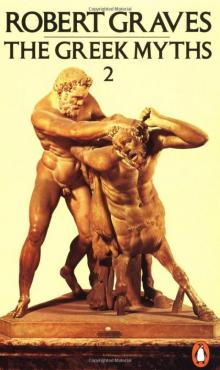 The Greek Myths, Volume2
The Greek Myths, Volume2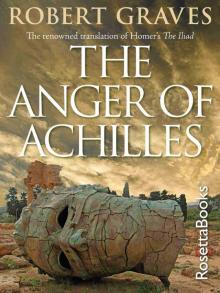 The Anger of Achilles: Homer's Iliad
The Anger of Achilles: Homer's Iliad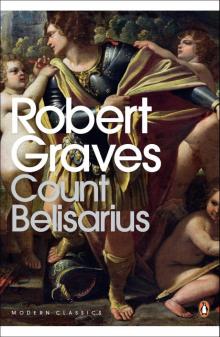 Count Belisarius
Count Belisarius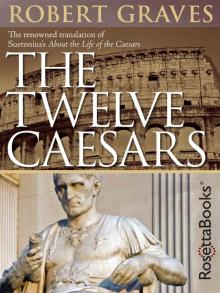 The Twelve Caesars
The Twelve Caesars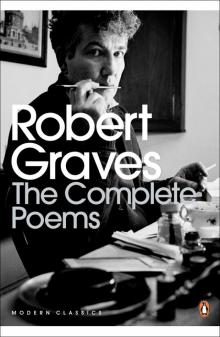 Complete Poems 3 (Robert Graves Programme)
Complete Poems 3 (Robert Graves Programme)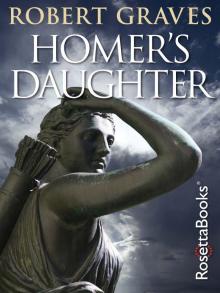 Homer's Daughter
Homer's Daughter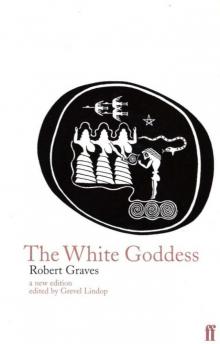 The White Goddess
The White Goddess Goodbye to All That
Goodbye to All That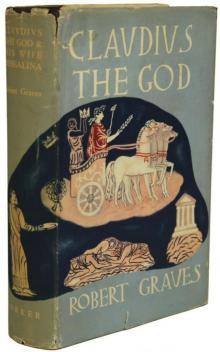 Claudius the God and His Wife Messalina
Claudius the God and His Wife Messalina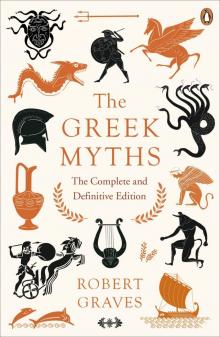 The Greek Myths
The Greek Myths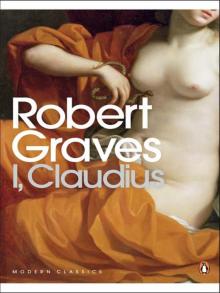 I, Claudius
I, Claudius The Islands of Unwisdom
The Islands of Unwisdom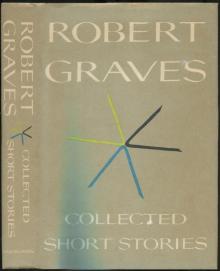 Complete Short Stories
Complete Short Stories The Golden Fleece
The Golden Fleece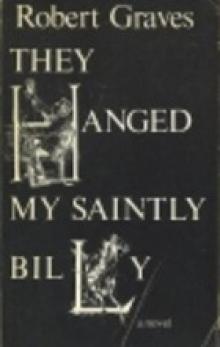 They Hanged My Saintly Billy
They Hanged My Saintly Billy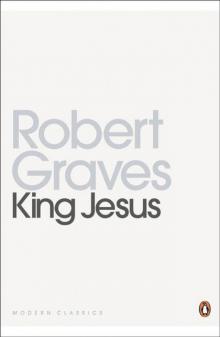 King Jesus
King Jesus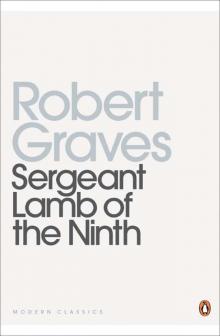 Sergeant Lamb's America
Sergeant Lamb's America Hebrew Myths: The Book of Genesis
Hebrew Myths: The Book of Genesis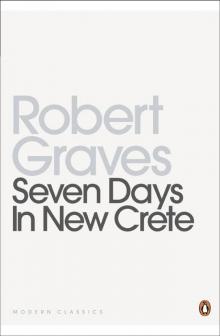 Seven Days in New Crete
Seven Days in New Crete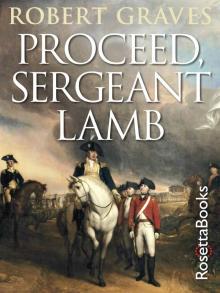 Proceed, Sergeant Lamb
Proceed, Sergeant Lamb Claudius the God
Claudius the God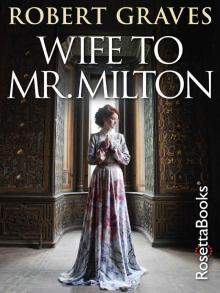 Wife to Mr. Milton
Wife to Mr. Milton The Complete Poems
The Complete Poems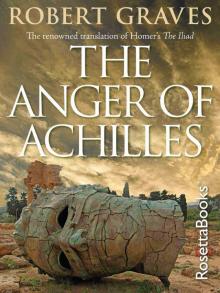 The Anger of Achilles
The Anger of Achilles Claudius the God c-2
Claudius the God c-2 Hebrew Myths
Hebrew Myths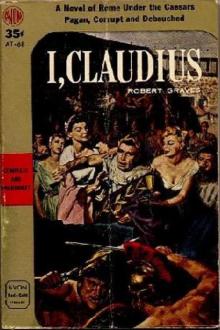 I, Claudius c-1
I, Claudius c-1 The Greek Myths, Volume 1
The Greek Myths, Volume 1